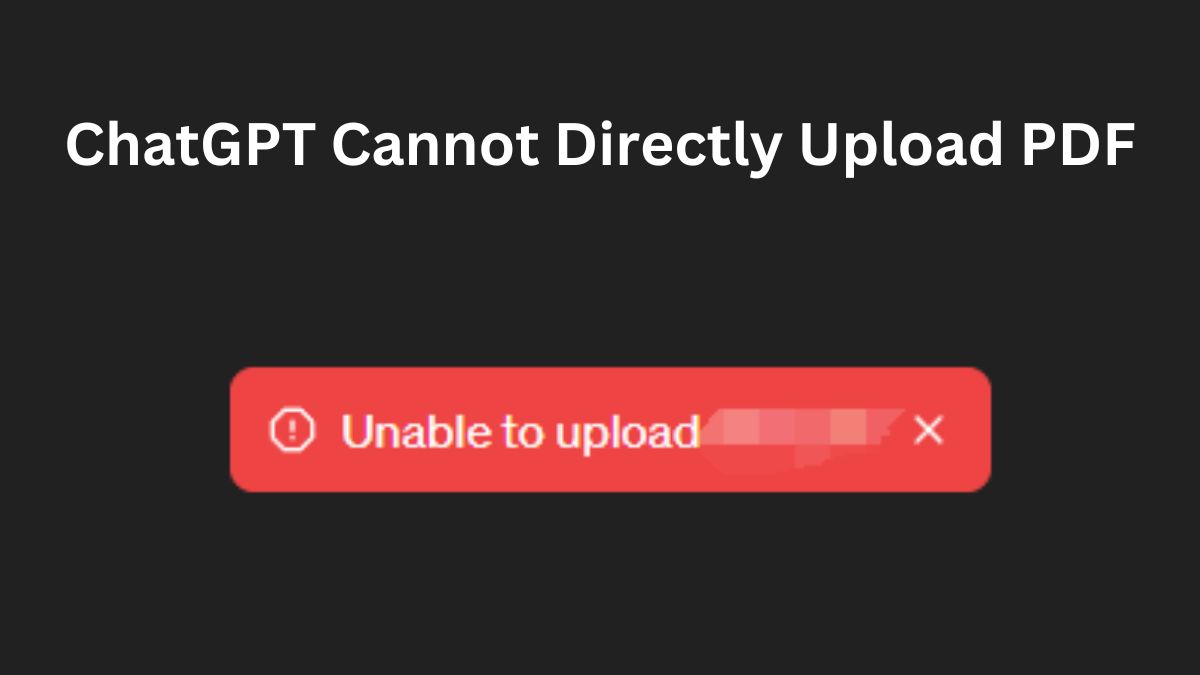ChatGPT, a revolutionary AI language model developed by OpenAI, has transformed how users interact with AI for tasks like content generation, coding help, and answering questions. However, one common limitation users encounter is that ChatGPT cannot directly upload or read PDF files. This limitation might be inconvenient for users looking to interact with PDF content quickly, but there are effective workarounds and tools that can bridge this gap. In this article, we’ll explore why ChatGPT cannot directly process PDF files, solutions to overcome this limitation, and the best practices for extracting information from PDFs using ChatGPT.
Why ChatGPT Cannot Directly Upload PDF Files
ChatGPT is designed as a text-based conversational AI model. Here are the main reasons behind its inability to upload or read PDF files directly:
- Data Input Limitations: ChatGPT, in its standard form, operates purely as a text-based model. It lacks built-in support for document handling or any file format processing, including PDFs.
- Security and Privacy Concerns: Allowing users to upload files directly to ChatGPT could lead to potential security risks. Sensitive information could inadvertently be shared, leading to privacy concerns.
- Model Constraints: Since ChatGPT is designed primarily for text-based conversations, it would require additional processing capabilities to read and interpret different file formats such as PDF, DOCX, or even images containing text.
- Processing Overload: Handling PDF files would require enhanced computational power, especially for models trained purely on text data, making it less efficient in terms of response time and processing capabilities.
Despite these limitations, there are several methods available to work with PDFs and ChatGPT effectively.
Solutions for Using ChatGPT with PDF Files
Since ChatGPT cannot handle PDFs directly, alternative methods allow users to retrieve and utilize information from PDFs with the AI’s assistance. Here are some effective solutions:
1. Convert PDF Text and Copy to ChatGPT
- How It Works: The simplest way is to open the PDF file, copy the text, and paste it into ChatGPT for analysis.
- Pros: Fast and does not require additional tools.
- Cons: Limited to smaller documents, as larger texts may exceed ChatGPT’s character input limit. Steps:
- Open your PDF reader and select the text you wish to extract.
- Copy the selected text and paste it into ChatGPT’s input field.
- Ask ChatGPT for summaries, insights, or any questions related to the pasted content.
2. Use OCR Tools for Scanned PDFs
- How It Works: If the PDF contains scanned images rather than text, Optical Character Recognition (OCR) tools are needed to extract the text.
- Recommended Tools: Adobe Acrobat, Google Drive (OCR feature), or online OCR platforms like OCR.space.
- Pros: Extracts text accurately from scanned documents.
- Cons: Requires additional steps and may not be 100% accurate with complex layouts. Steps:
- Upload your scanned PDF to an OCR tool.
- Copy the extracted text and paste it into ChatGPT for further assistance.
3. Use PDF-to-Text Conversion Tools
- How It Works: Online or software-based tools can convert PDFs to text or Word files, making it easy to transfer large chunks of text to ChatGPT.
- Recommended Tools: Smallpdf, PDF2TXT, or Adobe Acrobat’s export feature.
- Pros: Converts large documents quickly.
- Cons: Formatting may be lost in the conversion process. Steps:
- Convert the PDF to a text file using your chosen tool.
- Open the text file, copy the text, and paste it into ChatGPT.
4. Use API Integrations for Automated Workflows
- How It Works: Advanced users can use integrations with API services to automate the process. For example, using a PDF parser API in combination with OpenAI’s API can automatically process and send PDF data to ChatGPT.
- Pros: Efficient for large-scale or regular document processing tasks.
- Cons: Requires technical skills for setup and access to both the PDF parser and OpenAI API. Steps:
- Sign up for a PDF parser API like PDF.co or PDFParser.
- Use the API to extract content from the PDF and send it to OpenAI’s API.
- Program the integration to handle specific PDF content or text data processing tasks.
5. Third-Party Plugins in ChatGPT
- How It Works: In the Pro version of ChatGPT with GPT-4, some plugins can handle PDF files and perform various tasks like data extraction, summarization, and analysis.
- Pros: Convenient, quick, and doesn’t require external tools.
- Cons: Limited to users subscribed to the Pro version with plugin access. Steps:
- Go to ChatGPT’s plugin store and enable the appropriate PDF plugin.
- Upload your PDF, and the plugin will process and extract text.
- Ask ChatGPT to analyze or summarize the extracted content.
Best Practices for Extracting Information from PDFs with ChatGPT
For a seamless experience, follow these best practices to ensure accurate information extraction:
- Break Down Long Texts: If working with extensive documents, break the content down into smaller parts to avoid exceeding ChatGPT’s input limits.
- Use Summarization Techniques: When dealing with lengthy documents, ask ChatGPT to summarize key points rather than pasting the entire content.
- Choose High-Quality Conversion Tools: Not all PDF-to-text tools are equally effective. Invest time in selecting reliable tools that preserve text quality and formatting.
- Prioritize Privacy and Security: When using third-party tools, ensure they comply with data privacy regulations, especially if dealing with sensitive or confidential information.
Conclusion
While ChatGPT does not currently support direct PDF uploads, a variety of solutions make it possible to work effectively with PDF content. From simple copy-pasting techniques to advanced API integrations, these methods offer users the flexibility to harness the power of ChatGPT in conjunction with PDF documents. By choosing the right approach for your needs, you can unlock a range of possibilities for summarizing, analyzing, and interacting with PDF content efficiently.
With these methods in place, users can bridge the gap and utilize ChatGPT to its full potential, even with complex document formats like PDF.

